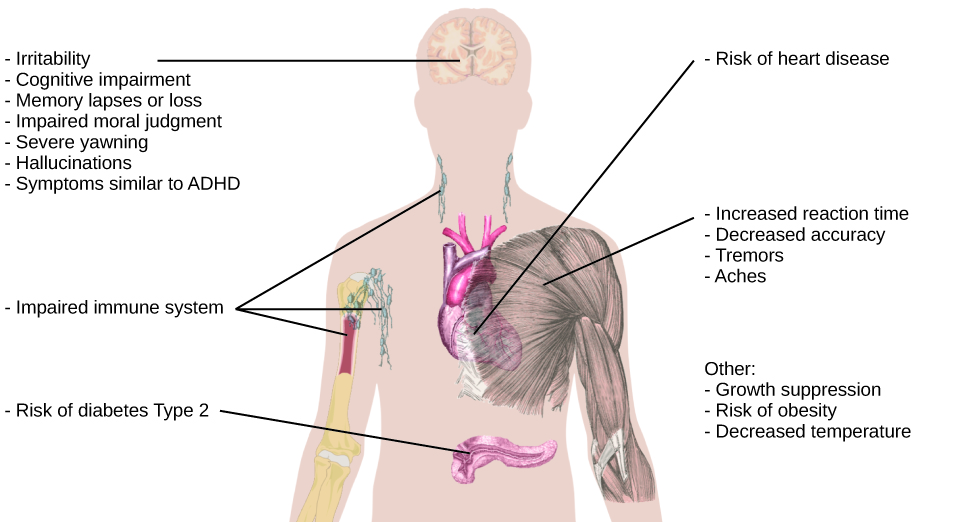- Explain disruptions in biological rhythms
- Describe the symptoms and treatments for common sleep disorders
Disruptions of Normal Sleep
Whether lark, owl, or somewhere in between, there are situations in which a person’s circadian clock gets out of sync with the external environment.
One way disruption of sleep happens involves traveling across multiple time zones. When we do this, we often experience jet lag. Jet lag is a collection of symptoms that results from the mismatch between our internal circadian cycles and our environment. These symptoms include fatigue, sluggishness, irritability, and insomnia (i.e., a consistent difficulty in falling or staying asleep for at least three nights a week over a month’s time) (Roth, 2007).
Shift Work Woes
Individuals who do rotating shift work are also likely to experience disruptions in circadian cycles.
Rotating shift work refers to a work schedule that changes from early to late on a daily or weekly basis. For example, a person may work from 7:00 a.m. to 3:00 p.m. on Monday, 3:00 a.m. to 11:00 a.m. on Tuesday, and 11:00 a.m. to 7:00 p.m. on Wednesday. In such instances, the individual’s schedule changes so frequently that it becomes difficult for a normal circadian rhythm to be maintained. This often results in sleeping problems, and it can lead to signs of depression and anxiety. These kinds of schedules are common for individuals working in health care professions and service industries, and they are associated with persistent feelings of exhaustion and agitation that can make someone more prone to making mistakes on the job (Gold et al., 1992; Presser, 1995).

While disruptions in circadian rhythms can have negative consequences, there are things we can do to help us realign our biological clocks with the external environment. Some of these approaches, such as using a bright light, have been shown to alleviate some of the problems experienced by individuals suffering from jet lag or from the consequences of rotating shift work. Because the biological clock is driven by light, exposure to bright light during working shifts and dark exposure when not working can help combat insomnia and symptoms of anxiety and depression (Huang, Tsai, Chen, & Hsu, 2013).
Insufficient Sleep
| Age | Nightly Sleep Needs |
|---|---|
| 0–3 months | 12–18 hours |
| 3 months–1 year | 14–15 hours |
| 1–3 years | 12–14 hours |
| 3–5 years | 11–13 hours |
| 5–10 years | 10–11 hours |
| 10–18 years | 8–10 hours |
| 18 and older | 7–9 hours |
When people have difficulty getting sleep due to their work or the demands of day-to-day life, they accumulate a sleep debt.
sleep debt
A person with a sleep debt does not get sufficient sleep on a chronic basis. The consequences of sleep debt include decreased levels of alertness and mental efficiency.
Interestingly, since the advent of electric light, the amount of sleep that people get has declined. While we certainly welcome the convenience of having the darkness lit up, we also suffer the consequences of reduced amounts of sleep because we are more active during the nighttime hours than our ancestors were. As a result, many of us sleep less than 7–8 hours a night and accrue a sleep debt.
If you lie down to take a nap and fall asleep very easily, chances are you may have a sleep debt. Given that college students are notorious for suffering from significant sleep debt, chances are you and your classmates deal with sleep debt-related issues on a regular basis. Fall 2024 data from over 25,000 undergraduates revealed that only 42.6% slept more than hours on weeknights and nearly 45.4% felt tired/sleepy 3–5 days in the past week.[1]
Consequences of Sleep Debt
Sleep debt and sleep deprivation have significant negative psychological and physiological consequences. A lack of sleep can result in decreased mental alertness and cognitive function. In addition, sleep deprivation often results in depression-like symptoms. These effects can occur as a function of accumulated sleep debt or in response to more acute periods of sleep deprivation. Sleep deprivation is associated with obesity, increased blood pressure, increased levels of stress hormones, and reduced immune functioning (Banks & Dinges, 2007).
A sleep-deprived individual generally will fall asleep more quickly than if they were not sleep-deprived. Some sleep-deprived individuals have difficulty staying awake when they stop moving (for example, sitting and watching television or driving a car). That is why individuals suffering from sleep deprivation can also put themselves and others at risk when they put themselves behind the wheel of a car or work with dangerous machinery.
Some research suggests that sleep deprivation affects cognitive and motor function as much as, if not more than, alcohol intoxication (Williamson & Feyer, 2000). Research shows that the most severe effects of sleep deprivation occur when a person stays awake for more than 24 hours (Killgore & Weber, 2014; Killgore et al., 2007), or following repeated nights with fewer than four hours in bed (Wickens, Hutchins, Lauk, Seebook, 2015). For example, irritability, distractibility, and impairments in cognitive and moral judgment can occur with fewer than four hours of sleep. If someone stays awake for 48 consecutive hours, they could start to hallucinate.

- American College Health Association (ACHA-NCHA IIIb), Undergraduate Executive Summary, Fall 2024 — sleep duration, daytime sleepiness, and “felt rested” metrics for U.S. college students. ↵